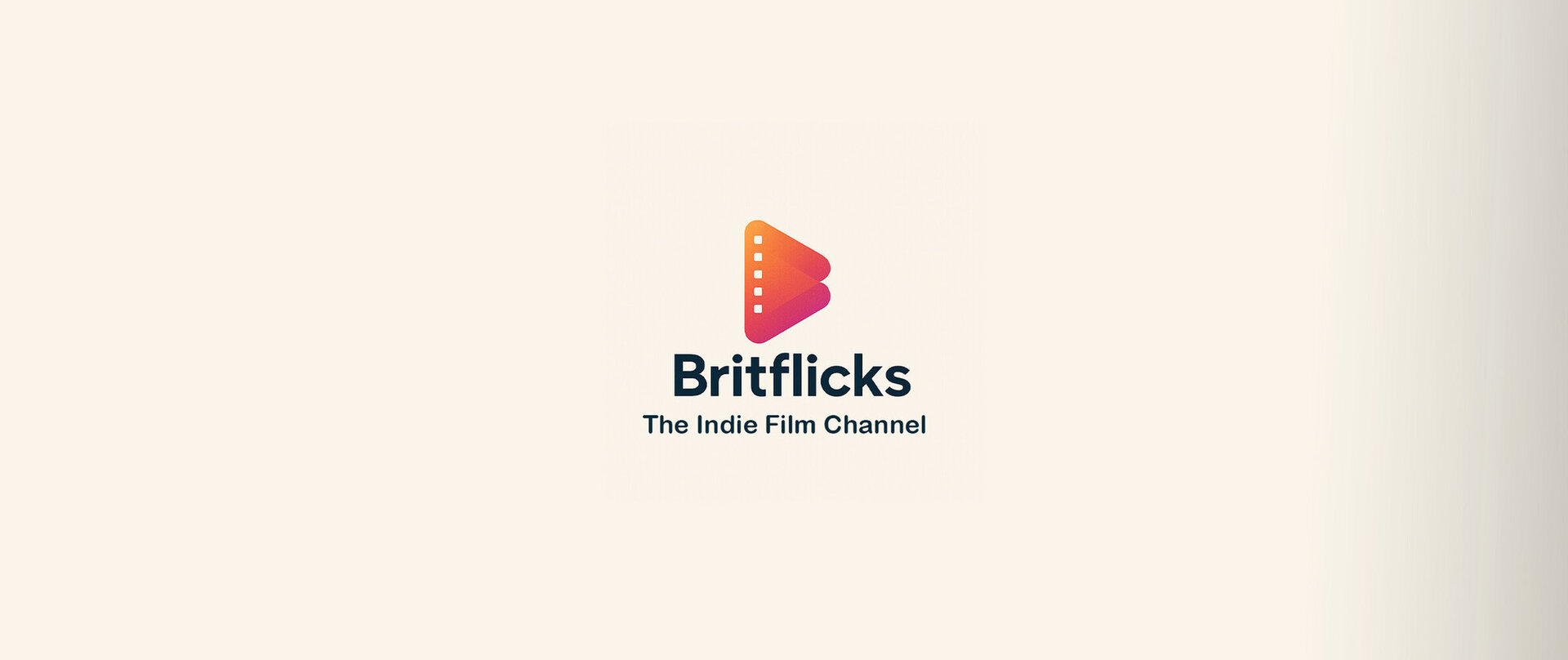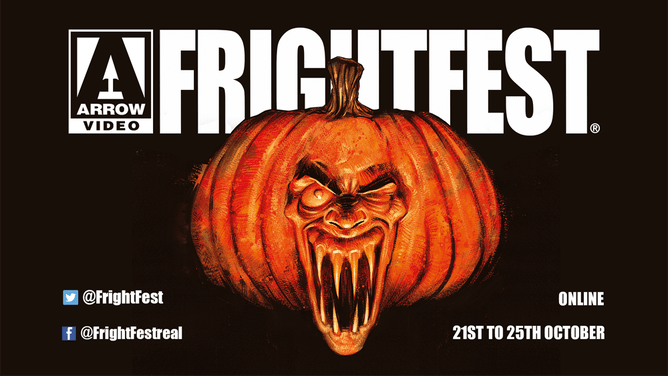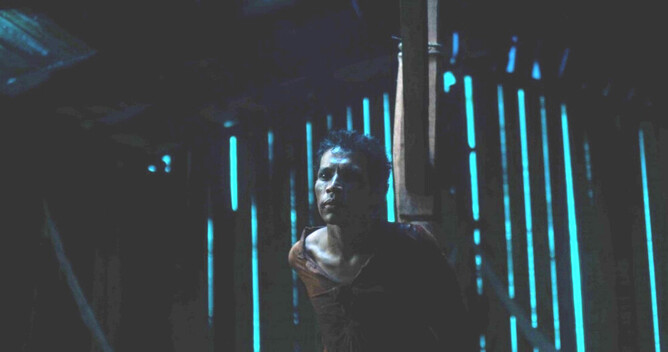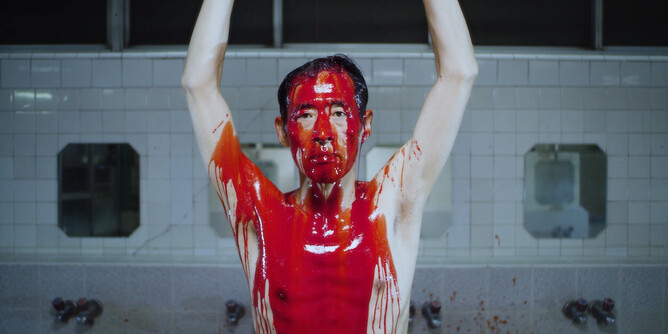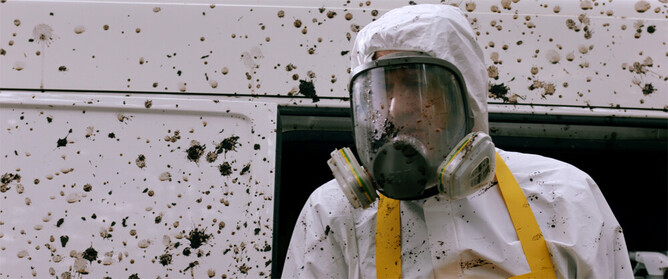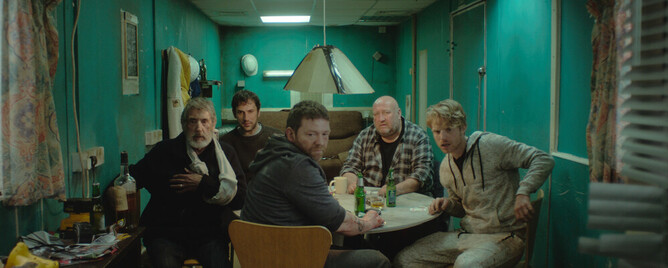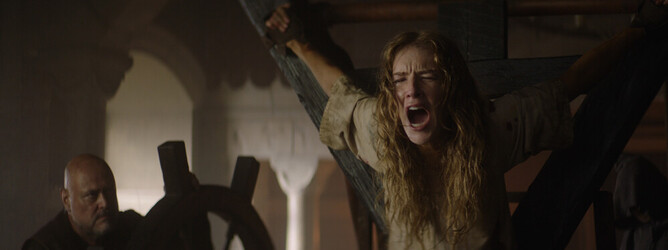Arrow FrightFest Digital Day 3 Reviews.
Once again Stuart Wright reports back from deepest cyberspace with his look at THE RETURNED, WOMAN OF THE PHOTOGRAPHS, TAILGATE, CONCRETE PLANS & THE RECKONING from Day 3 Of Arrow FrightFest Digital 2.
LOS QUE VUELVEN (aka THE RETURNED)
Director: Laura Casabé.
Writers: Laura Casabe, Lisandro Colaberardino and Paulo Soria
Cast: Alberto Ajaka, Edgardo Castro, Javier Drolas, Lali Gonzalez.
Argentina.
THE RETURNED is a wonderfully understated period horror –set in 1919, in the dense jungles of the border between Argentina and Brazil. Mariano and his wife, Julia are pioneers of this new world. They’re a symptom of the European curse that murdered most of the natives out of existence, and those they spared now work in servitude to an ongoing decimation of a culture than no longer seems to matter. Despite this, some of the old ways and myths live on and that is what Mariano, Julia and the rest of their sophisticated, God-fearing peers find out the hard way.
When Julia gives birth to another still born baby she turns to her housemaid, Kerana, a descendent of the local Guarani tribe with the desperate hope of tapping into the tribal folklore belief in the magical, life giving powers found in the waterfalls – the Iguazo. Kerana warns against it, but entitled Julia ignores her advice and by dabbling in what she does not understand, triggers more unnecessary tragedy for an already devastated community.
Told in a precise, non-linear fashion, Casabe’s film invites us to see most of the action from the antagonist’s point view – i.e. the Europeans. This way the story can circle back round itself to show that the horror set free by Julia’s selfishness is really just deserts, for the much bigger crimes against humanity. In a way, it is like how Lucky McKee focuses on the family’s POV for much of THE WOMAN (2011).
Casabe’s accusatory camera stares in utter disbelief at the colonialists, constantly questioning their motives. It reminds you so much of Jennifer Kent’s grim portrayal of the Brits post-genocide of native Australians in THE NIGHTINGALE (2019). Meanwhile the verdant roar of the jungle, the bird and/or insect chorus and the rush of streams and rivers screams go away, please go away and leave us alone, but it’s already too late. All that can be achieved is a little restorative justice before the next wave of invaders reach these shores to continue the march of progress.
THE RETURNED is a powerful piece of genre cinema that speaks loudly for the forgotten Guarani tribe, their traditions and the unjust way everything was taken from them.
WOMAN OF THE PHOTOGRAPHS
Director: Takeshi Kushida.
Writer: Takeshi Kushida.
Cast: Toshiaki Inomata, Toki Koinuma, Hideki Nagai, Itsuki Otaki.
Japan.
Centred around Kai’s photo lab and retouching shop, WOMAN IN THE PHOTOGRAPHS is reminiscent of Wayne Wang’s SMOKE (1995) in the way that the world and their stories came to tobacconist Auggie without him leaving his counter. Kushida’s film concerns itself with only two customers: Hisako, the divorced, grieving father, who drinks himself to sleep each night to forget the decade long pain of losing his seven year-old daughter, and subsequent divorce that followed her death; and Saijo, the single nurse who needs a picture retouching for a matchmaking website. Kai’s active addition to the tale is Kyoko. She’s a former ballet dancer turned social media influencer he finds injured in the park. She’d fallen while taking selfies in elaborate yoga poses.
For a film about seeing there’s a lot to hear in WOMAN IN THE PHOTOGRAPHS. Kushida turns up the sound on the most insignificant of noises. Even the pen gliding over the Wacom tablet, during the Photoshop sequences, gets equal billing with any dialogue spoken. It’s an intrusive choice that is always at odds with the tone of the action on screen. This sensory overload distracts, in a good way, from over relying on your eyes to see the truth of each situation. Saijo’s returns over and over to get her picture more perfect. Ruminating that she’s trying to find the beauty in herself that her potential suitor will see when they meet.
Kyoko moves in with Kai and through a brief collaboration, the pair experiment with retouched photos that remove her visible scars – from the fall - and then, after losing followers and likes, with the scars on full view. The later approach makes Kyoko a social media sensation again, but this brief rise in popularity ends abruptly with no hope of a second comeback. Her attempts at self-destruction draws the monosyllabic Kai out of his face-saving routines and brings the couple closer together – much to Hisako’s delight.
WOMAN IN THE PHOTOGRAPHS is an intimate look at loneliness, vanity and notions of beauty. It’s a romance waiting to blossom. It’s a delicate comedy with shades of horror that examines the absurdity and emphasis placed on the surface version of ourselves, and how easily we perpetuate these societal pressures through technologies designed to make our lives easier, not harder. As the Dead Kennedys said: “Give me convenience. Give me death”. Despite these masochistic tendencies WOMAN IN THE PHOTOGRAPHS demonstrates that to find the right person that is your soulmate takes a lot of looking. Oh the sweet irony for a man who spends his working day only staring at women’s faces as imperfect images for him to fix.
TAILGATE (aka BUMPERKLEEF)
Director: Lodewijk Crijns.
Writer: Lodewijk Crijns.
Cast: Jeroen Spitzenberger, Anniek Pheifer, Roosmarijn van der Hoek, Liz Vergeer.
The Netherlands.
Selfish Hans doesn’t want to drive across Holland with his wife and two daughters to visit his parents, but he must. He’s clearly got so much more on his mind that he’s barely present – even when he’s sat in the car with them. On the way, impatient Hans wants to drive 50kph over the speed limit, but Ed, in the white van in front of him, trundling within the 100kph speed limit is compromising his right to drive as fast as he likes. No amount of tailgating and horn blowing will make Ed shift, and to dent Hans’ foolish pride even further, traffic builds up behind and now he’s being honked at too. Eventually, there’s an opportunity to overtake the Sunday afternoon plodder. As he holds Ed’s stare, he gestures what he thinks of him and zooms off. The audience knows what a mistake this may turn out to be. They’ve already seen Ed pump weedkiller into a cyclist’s mouth with the kind of calm and calculated menace you’d associate with Javier Bardem’s Anton from NO COUNTRY FOR OLD MEN (2007). This never losing his cool trait will be the undoing of Hans and his family, because like other taut thrillers on the highway such as THE HITCHER (1986) or DUEL (1971) or UNHINGED (2020) Ed is seeking his own form of bloody retribution and once he’s decided he needs it, he won’t give up until he has it.
On the face of it, the heightened road chase, traumatised family in extreme peril, leading to a home invasion is psychopath chasing you 101. But who is the real villain? That’s a question TAILGATE asks you to consider on a number of occasions. Hans is demonstrably a despicable man. Arrogant for one, but sexist and ageist too. Worse than that he’s teaching his children to be the same. Much of what incites the dumb decisions he takes in the face of Ed implicitly come from an impotent rage he has about life and his minuscule place in it. Standing up to Ed is his moment to shine; to prove what an imperious, alpha male he is. This isn’t to excuse Ed’s actions, he suffers the same problem, but from a self-righteous, why can’t we all take some responsibility and follow rules. One wants to break away. The other wants us to stay in our lanes – pun intended.
Willem de Wolf excels as the coolheaded killer. You could run and run with this character as your bad guy for many films. In a break from the heart stopping action, there’s a hilarious ‘slow’ car chase through a tight, cycle friendly suburban housing development. It’s the absolute antithesis of the American nightmare road movie trope of being forced to drive so dangerously fast on the open the highway by your newly acquired nemesis that you’re bound to crash. In this Dutch context, everything about the layout of the roads is designed to slow you down and consider other road users over the car.
Ultimately, TAILGATE works because the notion that toxic masculinity is the true villain of our times. Both the protagonist and antagonist are not prepared to back down from the stand they’ve decided to take. Ed is happy to take the law into his own hands when he judges a wrong has gone unpunished. Whereas Hans is quite willing to put his whole family at risk for sake of his male ego. Both are dumb hills to die on (literally) but it does make for very entertaining thrill ride around the highways and bi-ways of Holland.
CONCRETE PLANS
Director: Will Jewell.
Writer Will Jewell.
Cast: Amber Rose Revah, James Lance, Kevin Guthrie, Charley Palmer Rothwell.
UK
This is an easy one. Every reviewer is thinking it - AUF WIEDERSEHEN, PET (1983-2004) meets STRAW DOGS (1971), but that’d to be miss a trick or two. Will Jewell’s CONCRETE PLANS is BOYS FROM THE BLACK STUFF (1982) and RIFF-RAFF (1991) meets BEST LAID PLANS. It’s inviting us to stare at the unfair economic game of life we are forced to partake. A life sadly spent too long in pursuit of money. Jewell’s takes that basic societal flaw and examines the injustice of the power wealth gives you for zero effort, the lengths people will go to get money, and what they’re prepared to do once they have it. Either by design, or by accident, CONCRETE PLANS is a class war film. There’s Bob, the construction company owner. He priced the job so low, to insure he got it, he’s forced to bring an even more desperate bunch of men than himself to renovate the Hegerty Property in deepest, remotest Wales. There’s Steve, his whining, workshy nephew – entitled to everything, deserving of nothing. There’s xenophobic Jim whose recent violent escapades mean he’s on the run from the law already. There’s the illegal immigrant, Viktor, from the Ukraine - sending his money east so his estranged daughter can have some quality of life without him. Finally, there’s nice guy Dave from the welsh valleys who needs to work, despite being well past the age of retirement. Regardless of their faults and frailties, these guys are at least prepared to work to earn their money. Their employer on the other hand is ex-forces ballbreaker Simon. He inherited his wealth from his officer class ancestry. Pig-headed, spoiled and stubborn, he is making alterations to the family property despite cash flow issues and threats of losing the whole of his inheritance from an offshore account in the Cayman Islands. His partner Amy seems blissfully unaware of his fiscal worries and the tyrannical way he treats the builders.
Couped up in a static caravan for three months, it doesn’t take much to make this powder keg of testosterone explode into knee jerk decision making and misdirected anger. Add in no wages being paid and you’ve Animal Farm ready for revolution. Once Simon is taken hostage and they find out there never was any wages, the veneer of human decency is wiped away from enough of them to make the revenge sudden, bloody and deadly – soon after it’s every scared man for himself. It’s frightening what happens to those who die, but it’s more frightening to think they died waiting to receive less than £5,000 and the false hope they’d miraculously become millionaires. Made even more tragic when the real sting in the tale is revealed during the denouement.
In 1987 Margaret Thatcher said to Woman’s Own: “"They are casting their problems at society. And, you know, there's no such thing as society. There are individual men and women and there are families. And no government can do anything except through people, and people must look after themselves first. It is our duty to look after ourselves and then, also, to look after our neighbours."
CONCRETE PLANS is the nightmare reality of her vision for a society-free Britain.
THE RECKONING
Director: Neil Marshall
Writers: Edward Evers-Swindell, Charlotte Kirk and Neil Marshall
Cast: Joe Anderson, Charlotte Kirk, Sean Pertwee, Steven Waddington.
UK.
Neil Marshall’s sixth feature film takes us back to the bleak godfearing times of black death, political upheaval and religious infighting for the UK’s troubled soul. It stars Marshall’s co-writer, Charlotte Kirk as Grace, the grieving wife, struggling to make ends meet without her man to work the land. She is desperate to keep a roof over her head and terrified authorities will take her new born when the laird’s lacky, Pendleton, insinuates he’ll happily take other forms of payment. She offers him enough jewellery to cover six months, but he has no other intentions than having her. She fights back and for striving to keep her independence, she is tagged a witch, separated from her child and jailed. Enter the deliciously evil Moorcroft (Sean Pertwee), literally twirling his waxed moustache with the spirit of Vincent Price, as the inquisitor tasked with extracting her confession. He tells Pendleton: “London is lost. 1000s have fled to the country. It’s as if the day of judgement has finally arrived.” A statement about the black death that feels unnervingly prescient as we attend Frightfest from our homes.
With the aid of the ghosts of her husband and mother, Grace resists Moorcroft’s violent tools of persuasion and torture, but something more demonic and other worldly brews to wreak havoc on the self-righteous. THE RECKONING is a proper rip, roaring yarn about witchfinder era Britain that is best when the fighting is in full flow or skulls are being squashed under cartwheels.
Click HERE for our latest Arrow FrightFest coverage.
